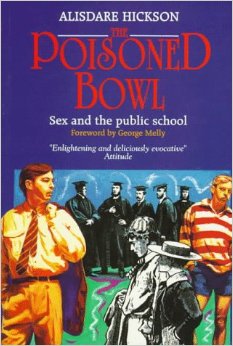The Poisoned Bowl and the 5000 Letters May 29, 2015
Author: Beach Combing | in : Actualite, Contemporary, Modern , trackbackBeach has not offered up a rogue researcher for some time: the last was mummy maker, Bob Brier, a year ago. Rogue researchers, for the uninitiated are those men and women, with doctorates, who do things that others in their discipline might consider eccentric. To call someone a ‘rogue researchers’ is a sign of the greatest respect for this blogger: the equivalent of giving a golden star and a free toaster. So come on down Alisdare Hicks, author of The Poisoned Bowl and prepare to be praised. Alisdare is a sociologist (but Beach is forgiving) and AH published, in 1996, a book entitled The Poisoned Bowl: Sex and the Public School. Here a terminological explanation for US readers. ‘Public School’ in Britain refers, confusingly, to elite private schools where the upper middle classes have traditionally sent their children to board. These schools were, and for the most part are single sex and inevitably homosexuality featured in life there: as homosexuality is also found in prisons and on ships. The traditional Victorian view was that any ‘beastliness’ was a sin against God and man: Matthew Arnold was forever throwing his board rubber at students over this question. But there is an underlying suspicion that, let’s call them, ‘male bonding rituals’ may have created some strong relationships among Britain’s nascent ruling class: Spartan wannabes who wanted to conquer bits of Africa together instead of killing Helots.
The subject matter is extremely interesting in its own right: here we have a major Beachcombian theme, the bits of history that no one will talk about. But what really lifts Alisdare out of the ranks of drone sociologists is the method that he used to investigate homosexuality in these schools. Did he shave and try and enroll? Did he bug the rugby changing rooms? No, something far more audacious. Alisdare began (tamely) by putting ads into gay magazines asking for reminiscences. However, perhaps he felt that this was a little too easy. He also wanted opinions from heterosexual ex public school boys, who had seen or experimented with homosexuality. But how could he reach them? Beach considers himself ingenious but he never would have the wit or courage to go through with this.
I was also eager to obtain recollections from another spectrum of the population, many of whom would be primarily or exclusively heterosexual. So I wrote to five thousand Who’s Who and Debrett’s name listed as ex public school boys. In the most deferential language I could come up with, I asked them for their recollections of homosexuality and intimate friendships at school and explained that I was writing a book on the subject and that I hoped to include a range of comments, by letter and interview from Old Boys.
Who’s Who and Debretts are the lists of glory: the Britons who matter and who, generally speaking, don’t blog. Perhaps you have to be from the sceptered isle to enjoy this, but the very idea of Colonel Wooley (Retir’d, King’s Own) opening Alisdare’s letter at breakfast and involuntarily spitting his toast out through The Telegraph and into his wife’s lap is to be treasured. Not surprisingly not all those who received these unusual missives were happy. Alisdare notes that in several cases insults were written into the margin and his letter returned to him: ‘You prurient shit. At my school you would have been done!’ etc etc Interestingly several hundred replied, though, in a more constructive tone: Beach was astounded at not just the frankness of repliers but the fact they allowed their real names to be used.* Unfortunately the deferential letter is not included in the book: if Alisdare, who recently has had some nasty shaves with the Egyptian security services, has a copy to hand Beach would love to publish it.
We are always looking out for rogue researchers: drbeachcombing AT yahoo DOT com
What would happen if you wrote to five thousand of the sparkling ones and asked whether they’d seen fairies?



